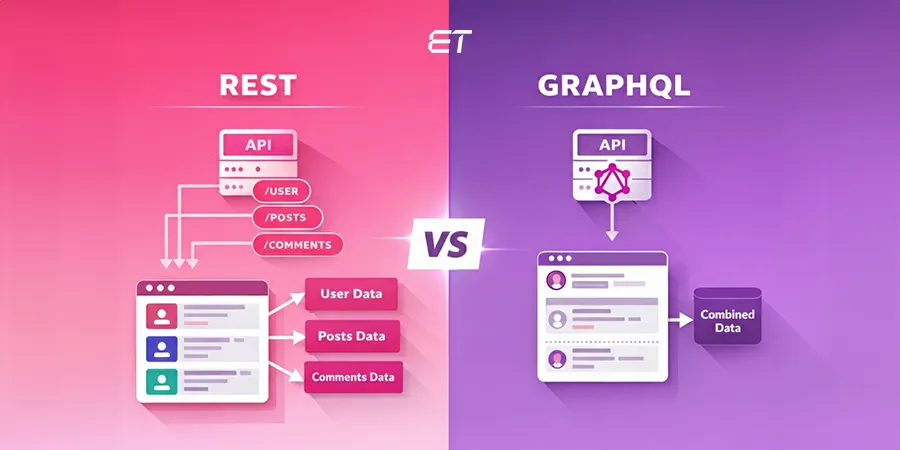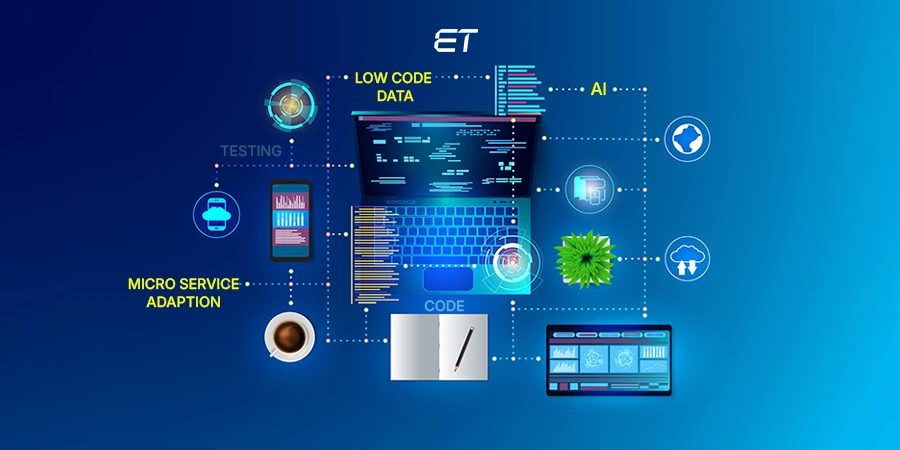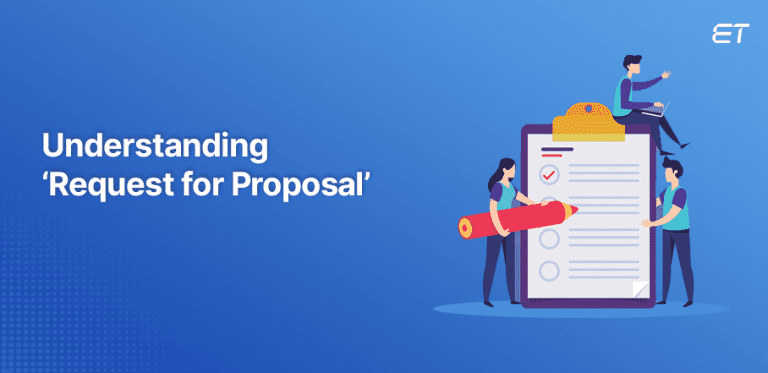
What is an RFP for Software Development?
The need for an IT vendor can arise at any time. Therefore, it is essential for a business to know how to create an RFP for software development.
The full form of RFP is a ‘request for proposal.’ This document helps choose the most suitable vendor for a specific IT project.
Once you formulate a systematic RFP for software development, selecting an appropriate partner becomes simple. With decent knowledge, you can complete drafting an RFP quickly. In fact, 45% of RFPs finish in the time frame of 6 – 20 days.
With the right resources, you can quickly join the ranks of companies that complete an RFP. So, without any ado, read this blog. It contains valuable information on the concept, steps, and vital parameters of requests for proposals.
Understanding RFP for Software Development

Let us explain the concept of RFP through a hypothetical example.
Consider the case of Mr. Travis Smith, a digital marketing (DM) agency owner. Travis and his teammates offer SEO, Content Marketing, and Graphic Designing services.
However, Travis wants to expand the scope of his business. In addition to DM offerings, he wants to expand his portfolio by providing website development services. The problem is that Travis does not have the resources to offer web development support.
So, he decided to hire dedicated developers from an established IT company. This decision allows him to save time and expand his agency’s portfolio simultaneously.
Mr. Smith doesn’t even need to conduct interviews and perform technical assessments. He knows a reputed IT vendor can provide the best developers to work on his client projects.
Now, Mr. Smith begins to explore the list of possible partners. Unfortunately, the list is long, and he has more than 100 software development companies with similar ratings and services.
Still, he and his team managed to shortlist 10 IT vendors. But how will he choose the best option from these choices?
RFP to the Rescue
Travis and his team draft a ‘request for proposal’ and send this document to the shortlisted vendors.
They include crucial components to develop a comprehensive RFP for software development. This document contains the following elements:
- Statement of purpose
- Company description
- Project goals and scope
- Bidder requirements
- Response timeline
Now, the shortlisted software development companies can assess Mr. Smith’s project requirements. Next, the vendors can send their outlined proposals to Mr. Smith and his team.
The proposals make it easy for Travis to choose a vendor that aligns with his work approach. Overall, this RFP for software development helped Mr. Travis Smith and his team to get ten proposals and choose the best one.
Note: This is a hypothetical example. Mr. Travis Smith is an entirely fictional name that is mentioned only to humanize the explanation.

Main Components of Request for Proposal

The example is sufficient to elucidate the significance of RFP for software development, right?
In this section, we aim to explain the main facets of this request document. After reading, you can hopefully draft your RFP without further contemplation.
1. Overview and Background

With an RFP for software development, you connect with the prospects and portray your brand voice. So, this document should include the following aspects in the initial phase:
- Your company’s description
- Purpose of your software
- Area of operation
This overview makes it easier for companies to reply with their proposals. Remember, clarity is essential to receiving a good proposal without delay and iterations.
2. Project Scope and Expectations

This portion of your RFP for software development is the central pivot for your outreach. In this segment, you need to define the following pointers:
- Functions
- Features
- Deliverables
Functions correspond with the application or software’s operability. Features cater to the target audience’s convenience. Finally, deliverables depict your team’s expectations from the IT vendor.
Consider this:
- Which features and functions do you want in your software?
- What and how should the IT vendor assist you in the software development cycle?
So, your RFP for software development should include aspects like user types, integration requirements, source code, training materials, and other facets.

3. Technical Details
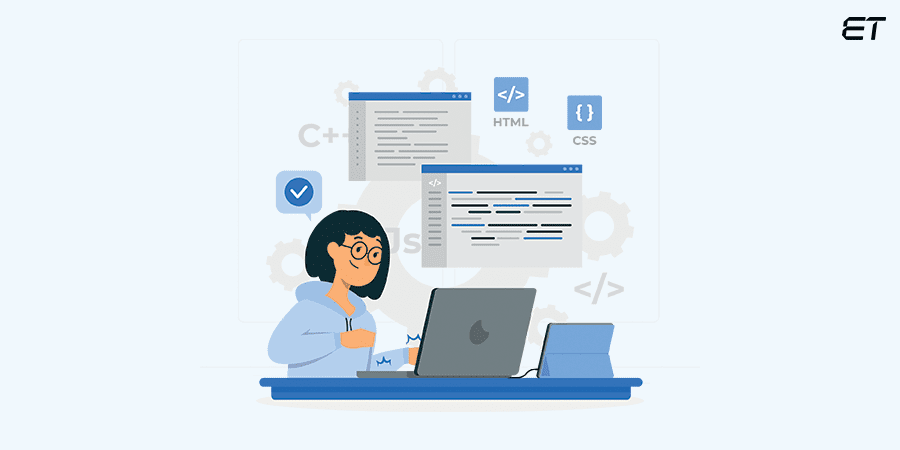
If you or your team has technical knowledge of the IT sector, this section can become more detailed.
Your RFP for software development can include the request for the following points:
- Tech stack: Programming languages, frameworks, databases, collaboration tools
- Architecture: Microservices, cloud, or others
- Security measures: Compliances, standards, or ISO codes
You can gauge a vendor’s technical proficiency or approach by mentioning these requests. So, ensure you include these points if possible.
4. Requirements and Selection Criteria

Let us move on to other vital requirements in your RFP for software development. Your request document should mention these aspects clearly:
- Expected level of experience
- Technical skills of the team
- Software development methodology
- Cost and preliminary estimate
- Proposed timeline
Analyzing the responses to these points can put you in a better position to choose a suitable IT vendor.
5. Miscellaneous Details

You should end your RFP for software development by including critical details for the IT vendor. Here are the essentials to include:
- Proposal submission deadline
- Format for submitting the RFP
- Contact details for queries
- Communication channel
Such a well-crafted RFP can attract more software development companies to submit their proposals. Eventually, you can choose the best fit from the responses and initiate an exciting project with a like-minded IT organization.
Advantages of Writing an RFP for Software Development
A ‘request for proposal’ document can prove beneficial on many fronts. Go through the following table to acquaint yourself with all the vital advantages.
| Benefit | Explanation |
| Clarity | The inclusions in the RFP for software development document make it easy for potential vendors to understand your project |
| Time-saving | By outlining the main details and expectations, you filter out the prospects who do not fit your business requirement |
| Innovative solutions | RFP for software development encourages vendors to submit competitive proposals. This healthy competition boosts the thinking ability, leading to innovative solutions |
| Low risk | Through a well-crafted RFP, you reduce the chances of misunderstanding and scope creep in the software development project |
| Better communication | Potential vendors can communicate freely with your team to craft a worthy proposal. This process lays an early foundation for fruitful two-way communication |
| Ease in evaluation | You can compare several proposals from potential IT vendors. This way, it becomes easy to assess the development approach, tech stack proficiency, and project management skills of each vendor |

Tips to Write an Effective RFP
How can you write an RFP for software development that serves its objective?
Consider the following steps:
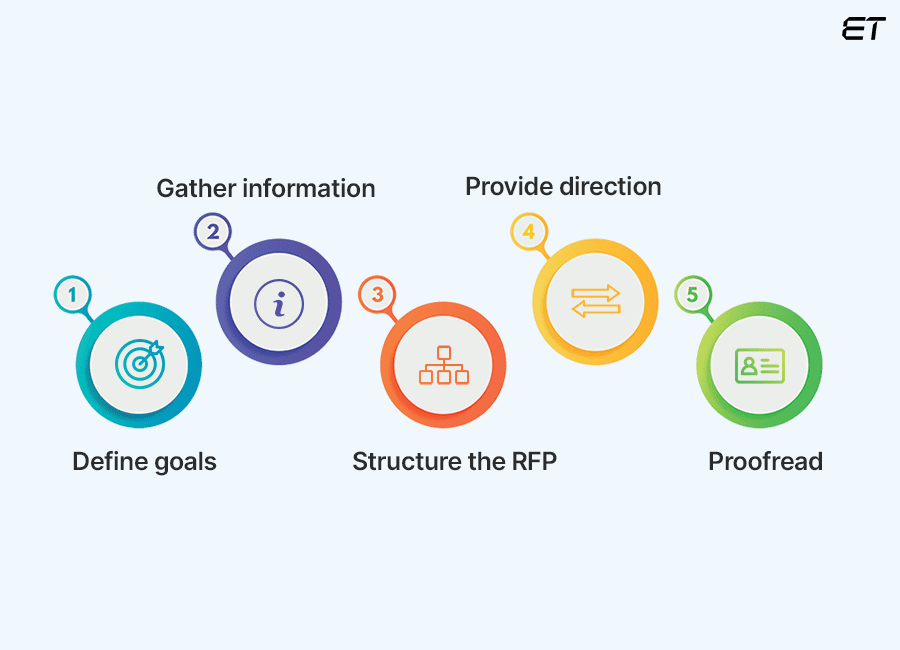
Let us understand each stage in detail.
1. Define goals: Before initiating the RFP, you should know the end objective of your project. Be clear on the problem, solution, target audience, and opportunities
2. Gather information: Research various software development methodologies and decide the perfect fit for your business. Also, accumulate details on the latest versions of frameworks, technologies, and tools
3. Structure the RFP: Your RFP for software development must have a logical structure. This outline can be as follows:
a. Company introduction
b. Area of operation
c. Project goals
d. Scope and deliverables
e. Technical requirements
f. Timeline and budget
g. Vendor selection criteria
h. Contact information
4. Provide direction: Encourage the potential IT vendors to offer additional insights or innovative solutions. Your RFP for software development should have an optimistic and assuring tone
5. Proofread: Finally, ensure your RFP has zero grammatical errors. Cross-check all the pointers before sending this document to the shortlisted software companies
Overall, these steps can ensure you create a comprehensive RFP that interests top IT companies when sending their proposals.
In a Nutshell
RFP for software development is a crucial document for any business that wants to choose a suitable IT vendor. An RFP or ‘request for proposal’ is a formal approach to inviting multiple IT companies to send their pitch for your software project.
It contains details like your company’s information, area of operation, project scope and requirements, and expectations. If you are sure about including specific technologies, this document can mention them.
By writing an effective RFP for software development, you gain clarity on choosing the best IT vendor according to your requirements. In the process, you can save time, reduce miscommunication, and evaluate several vendors before finalizing an apt one.
If you have an RFP ready and are looking for an expert proposal, send the document to us. Our 20+ year experienced team can offer a wide range of services, from offshore development to Power Apps consulting and more.
On the contrary, you can even book a quick online meeting to discuss your project or have a nice little professional chat!
Frequently Asked Questions
1. Who prepares RFP for software development?
RFP preparation is a collaborative effort among key team members. The most common profiles that contribute to formulating an RFP are Product Managers, Project Managers, Technical Experts, and Business Analysts.
2. What is the next step after an RFP?
Once you send the RFP document to the shortlisted IT vendors, it is crucial to wait for their response. After receiving the proposals, you must evaluate each vendor and make an informed decision.
3. How long is an RFP for software development?
There is no universal number to define an ideal RFP document’s length. However, RFPs for simple and complex IT projects can range between 5 – 10 and 20 – 30 pages, respectively. Rather than length, your RFP should emphasize clarity.



